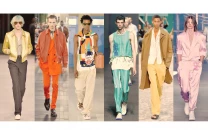Winta Zesu: the TikToker who banked $150k from hate
Rage-baiting is the new model of digital fortune

Content creator Winta Zesu knows how to rile up the internetand she's laughing all the way to the bank. The 24-year-old model-turned-TikTok sensation made $150,000 last year, fuelled by something most influencers fear: hate.
"I get a lot of hate," Winta shared in an interview with BBC. The reason? Her viral videos chronicle the life of a model with a "problem" most people would scoff atbeing "too pretty." What her millions of viewers don't often realise, though, is that she's playing a character designed to provoke outrage.
"Every single video of mine that has gained millions of views is because of hate comments," Winta explains. In one clip, she boasts about celebrity sightings, while in another, she jokes about starring in Gladiator II. Both are masterclasses in "rage bait"a social media strategy where creators intentionally spark anger to rack up engagement.
Winta's comment sections overflow with criticism, from "You're not the prettiest girl" to "Please bring yourself down, you have too much confidence." But it's precisely this vitriol that drives her success, her deadpan delivery blurring the line between performance and reality.
Rage bait, unlike clickbait, doesn't rely on misleading headlines to lure users in. Instead, it generates visceral emotional reactionsoutrage, frustration, and even disgust. And as marketing podcaster Andrea Jones explains, platforms reward this negativity.
"If we see a cat, we're like, 'Oh, that's cute,' and scroll on. But if we see someone doing something obscene, we may type in the comments, 'This is terrible,'" Jones notes. "That sort of comment is seen as a higher quality engagement by the algorithm."
This engagement translates into dollars. Social media platforms like TikTok, YouTube, and X (formerly Twitter) pay creators based on likes, comments, and shares. The more outrage Winta provokes, the more money she earns. "Some creators will do anything to get more views," Jones warns, "even if it means inciting rage."
According to Dr William Brady, a social psychologist, our brains are hardwired to respond to negativity. "In our past, this is the kind of content we really needed to pay attention to," he says. But in the digital age, algorithms amplify this tendency, making outrage seem more widespread than it really is.
"It makes people think it's more normal," Brady says. "On platforms like X, politically extreme content is actually produced by a very small fraction of the user base, but algorithms amplify it as if it were a majority."
The consequences extend beyond social media. Rage bait is now influencing political discourse, particularly during election cycles. "We're seeing increased amounts of active news avoidance around the world," warns Ariel Hazel, assistant professor of communication and media at the University of Michigan. "It can be draining to have such high emotions all the time."
Winta, for her part, draws a line when it comes to using rage bait in politics. "I don't agree with people using it to spread misinformation," she says. "If it's genuinely to educate and inform people, fine. But otherwise, it's not a joke anymore."
Social media platforms are beginning to acknowledge the issue. Meta's Adam Mosseri recently posted about the rise of "engagement bait," while X adjusted its Creator Revenue Sharing Program to focus on premium user engagement. But critics argue these changes are reactive rather than preventative.
As Winta's millions of followers continue to weigh in on her videoswhether in fury or fandomone thing is clear: in the age of rage bait, the line between trolling and thriving is razor-thin. For Winta, though, the hate isn't just noise. It's her business model.


















COMMENTS
Comments are moderated and generally will be posted if they are on-topic and not abusive.
For more information, please see our Comments FAQ